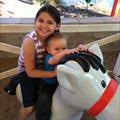October 2014 Moms
 BreandMikewedding
member
BreandMikewedding
member
Natural conception later in life
I just read an article on msn healthy living that said that natural conception later in life is tied to women having a longer life. What do they consider "later in life"? 33! Wtf!!! 33!
This discussion has been closed.





Re: Natural conception later in life
Yeah this might be a U/O but what society considers old and what mother nature considers old are just two different things Our bodies don't give two fucks about what's politically correct to say or think . I would love to say "oh it totally doesn't matter - 33 is YOUNG!" but the real deal is that even by 33 you could have a significantly depleted OR already. If there was one thing I would have done differently, I would have begun keeping track of my fertility situation starting at 30. I feel doctors should be more informative on this matter with women in general. Its such a taboo topic to really discuss seriously and yet so many women end up at 35+ without enough awareness.
Our bodies don't give two fucks about what's politically correct to say or think . I would love to say "oh it totally doesn't matter - 33 is YOUNG!" but the real deal is that even by 33 you could have a significantly depleted OR already. If there was one thing I would have done differently, I would have begun keeping track of my fertility situation starting at 30. I feel doctors should be more informative on this matter with women in general. Its such a taboo topic to really discuss seriously and yet so many women end up at 35+ without enough awareness.
ETA: I didn't have to do fertility but we were scheduled to go in two weeks after we got our bfp blessing. We were lucky - many aren't. We will have a good chance of doing fertility for number two based on our ages.
Native NYC-ers living in Switzerland - First time parents - 36 + 37
TTC: 8 Months / BFP: 2/8/2014 / EDD: 10/20/2014
I told my husband that any daughters we have will be required to read Taking Charge of your Fertility once they start their cycles. That book changed my life and really empowered me to ask important questions. I had struggled with irregular horrible cycles since I was 18 and doctors just brushed me off. If I had more information I could have received better treatment.
ETA - I think a lot of women focus on their careers and decide to have children later and very few think about the fact that doing so could make conceiving more difficult. Honestly the only age related factor that crossed my mind was how old I would be when my kids graduated. It wasn't until I saw the chart at the OBGYN's office shortly before TTC that I started to actually think about this issue.
I always had a gut feeling conceiving would be a challenge, but the talk of clomid in your 20's is just horrible. But then again, there are women in my community who are currently dealing with menopause at THIRTY.
I don't understand where you are getting the idea that you are more likely to conceive than not. Because even a perfectly healthy couple, young with no fertility issues only have a 20% chance of conceiving each cycle. Which leads to you being more likely NOT to conceive.
People with fertility problems don't tend to advertise their struggles so you many not have an accurate picture of what has gone on with those you meet. Even if they did conceive naturally most people don't advertise how long it took to conceive.
It wasn't until I became a member of this board that people really spelled out their process.
But when you are young and get brushed off by doctors saying everything is "normal". When I may have not had a cycle in 6 months or more. There is not a lot you can do. Then I go to a fertility clinic that did nothing but push hormones (Clomed and other meds to start a cycle) when we did not even know why I was not having cycles. My OB/GYN FINALLY took the time to investigate what was going on. Meds to get other areas of my body working right were the ticket.
So yes after you turn 30 your production decreases. So I think over all woman need to take personal responsibility. But if you have any on going history I think if you go to a doctor for help they should be willing to help. And look past the rules.
So yes a few of you have hit a nerve. But I also get a blessing that I had lost all faith and hope in.
I hear where you are coming from because similar to you, I was always stressed about having kids later in life although for me, it was a choice because I wanted to be older when I got married and had kids. And also similar to you, I was very fortunate to have no problems conceiving in my 30s.
But do you have any studies to support your claims in the bolded? Are you claiming that 50% or more women in their 30s are able to start families without struggle? I find that difficult to believe because it is a proven fact that fertility does decline in your 30s. Just because you and I were fortunate enough not to be affected by that statistic doesn't mean that we are the norm or even the average person though.